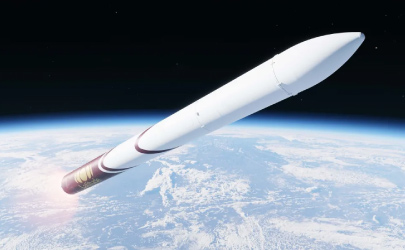The Rising Trajectory of Europe’s Small Launch Vehicle Market: Trends and Opportunities

"The European small launch vehicle market is experiencing significant growth, driven by a rising demand for affordable and flexible access to space. This surge is largely fueled by the increasing prevalence of small satellites, particularly those focused on Earth observation, IoT applications, and communication. Key players in the region, including Rocket Factory Augsburg, PLD Space, and Isar Aerospace, are actively competing to meet the growing need for dedicated and responsive launch services. The European Space Agency (ESA) and other governmental initiatives are playing a crucial role in supporting innovation and collaboration within this sector.
While the prospects are promising, challenges such as competition from global entities, regulatory hurdles, and the necessity for cost optimization remain. The market is bolstered by technological advancements, including the development of reusable rockets and additive manufacturing techniques. Analysts emphasize that this sector is vital for enhancing Europe's strategic autonomy in space, presenting opportunities for economic growth and innovation. To stay competitive, businesses must focus on scalability, reliability, and forging strong partnerships within the dynamic global space landscape."
The Europe Small Launch Vehicle market was valued at USD 0.41 Billion in 2023 and is projected to reach USD 0.89 Billion by 2030, with a compound annual growth rate (CAGR) of 12.1% from 2025 to 2030.
At the same time, Europe is working hard to lower launch costs and enhance propulsion systems to keep up with the increasing demand for small satellite launches. While Arianespace is currently leading the market, a number of smaller, more agile companies are also emerging, driving innovation and healthy competition.
Also, collaboration is on the rise among European nations and with international partners, which is speeding up technological advancements. All these efforts are positioning Europe as a significant player in the growing global SLV market.
Significant funding from ESA and European governments supports SLV research and development.
The European Space Agency (ESA) and various European governments are key players in boosting the small launch vehicle (SLV) market through significant investments in research and development. This funding is essential for developing cutting-edge launch systems, improving infrastructure, and creating innovative technologies that make SLVs more efficient and cost-effective. By providing public funding, they also help mitigate risks associated with ambitious projects, which encourages private companies to get involved and fosters collaboration between startups and established firms. Initiatives like Horizon Europe are designed to spur innovation, while ESA projects, such as Ariane 6, help maintain Europe’s competitiveness and independence in the global space industry.
Growing private sector interest in satellite deployment fuels demand for small launch vehicles.
There's a growing enthusiasm among private companies to launch satellites, especially for commercial purposes like telecommunications, earth observation, and internet services. This surge is significantly boosting the small launch vehicle (SLV) market. Businesses are looking for affordable and flexible launch options to satisfy the increasing need for small satellite constellations.
Industries that depend on satellite data, such as agriculture, climate monitoring, and disaster management, are expanding rapidly and fueling this demand even further. In response, both new startups and established companies in Europe are stepping up by providing dedicated SLV solutions. This shift is helping to reduce the reliance on larger, less efficient launch systems that have traditionally been dominated by government programs.
Innovative designs and technologies are making SLVs more affordable and accessible.
The small launch vehicle (SLV) market is witnessing a transformative shift due to groundbreaking designs and technologies that prioritize cost efficiency and accessibility. The advent of reusable rocket technology, notably through recoverable first stages, has drastically lowered both manufacturing and operational costs. Additionally, lightweight composite materials enhance performance while reducing expenses. Modular designs facilitate tailored solutions for various payloads, optimizing resource use and minimizing waste. Automation in production and launch operations further cuts costs, empowering smaller companies and startups to engage in satellite launches. These advancements not only broaden access to space but also stimulate growth in sectors that depend on satellite data, such as communications and remote sensing.
European firms are partnering globally to accelerate technological progress and share resources.
European small launch vehicle (SLV) companies are teaming up with partners around the world to boost their technology and make better use of their resources. By collaborating with international space agencies like NASA and various private companies, they can share valuable knowledge in areas such as reusable rocket technology and advanced propulsion systems. These partnerships open the door to state-of-the-art infrastructure and funding opportunities, which helps speed up the creation of more affordable SLVs. Through joint ventures and cooperative efforts, Europe is enhancing its position in the global market and driving innovation through the exchange of ideas. By tapping into global networks, these European firms are not only improving their capabilities but also shortening development times and expanding their presence in the ever-growing SLV market.
The European Union's policies actively promote space innovation and competitiveness.
The European Union (EU) is dedicated to boosting space innovation and competitiveness through a variety of policies and funding initiatives. Programs like Horizon Europe and the EU Space Program offer significant financial backing for research, technology development, and small launch vehicle (SLV) projects. A key focus of these initiatives is to achieve strategic autonomy, which means reducing reliance on non-European launch providers by building up local capabilities.
The EU is also committed to sustainability and efficiency in space technologies, supporting innovations like reusable SLVs. By establishing a supportive regulatory framework and encouraging partnerships between the public and private sectors, the EU creates a competitive environment that promotes technological progress and enhances Europe’s standing in the global space industry.
Competitive Landscape
Some of the major companies operating within the Small Launch Vehicle market are: Rocket Labs, Indian Space Research Organization (ISRO), Gilmour Space Technologies, Astra, Firefly Aerospace, Galactic Energy, SpaceX, Skyrora, Relativity Space, Blue Origin, United Launch Alliance, Isar Aerospace and Others.